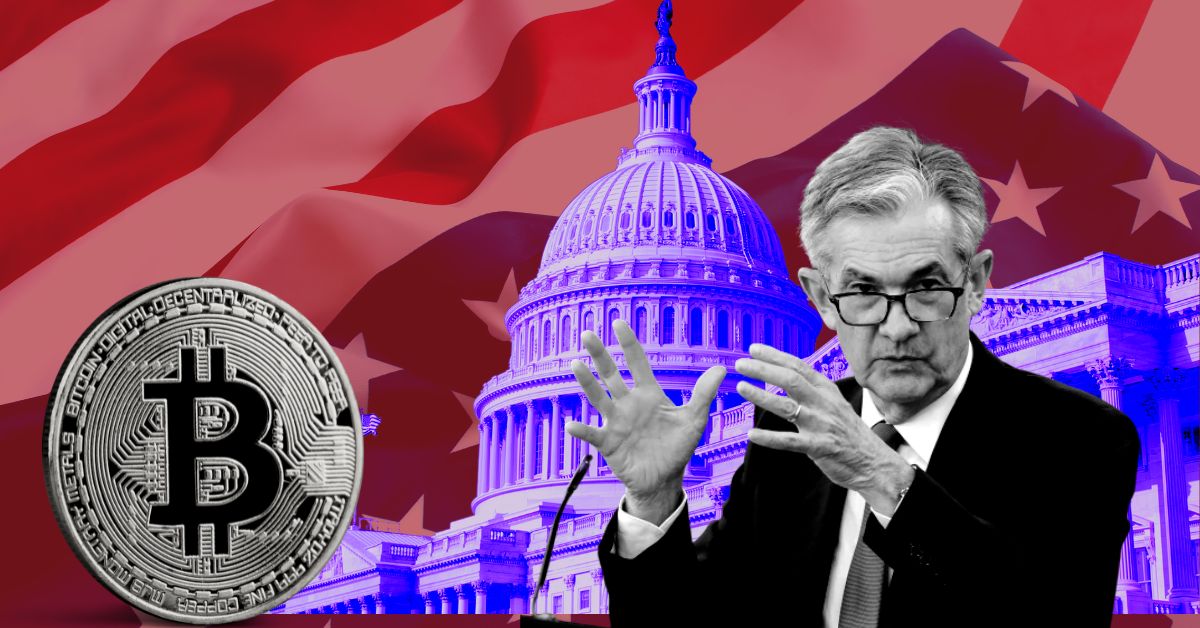Ethereum
Ethereum ETFs May Have Ended the SEC’s War on Crypto

that of May Ethereum spot ETF approval by the United States Securities and Exchange Commission (SEC) was the final blow to what can only be described as a record month for crypto policy – and the move could seriously jeopardize the The SEC’s Ongoing Crypto Crackdown.
As the deadline for approval of Ethereum ETFs approached, a bipartisan group of members of the House of Representatives sent a letter to SEC Chairman Gary Gensler urging the Commission to not only approve the funds, but also consider approving “other” digital asset ETFs in the future. And finally, the SEC finally went public late on that fateful Thursday and announced the approval of eight one-time Ethereum ETF applications.
According to Paul Grewal, Coinbase’s chief legal officer, the SEC’s approval of spot ETFs effectively considers Ethereum (ETH) to be a commodity. If Grewal is right his assessmentthen an ETH commodity would fall under the oversight of the Commodity Futures Trading Commission (CFTC), as opposed to the SEC, which is responsible for regulating securities.
This is a key distinction for ETH because the SEC’s mandate is to police securities and protect investors. Rather, the CFTC regulates commodities such as raw materials and agricultural products, with a focus on preventing market manipulation and fraud. The CFTC’s regulatory framework for commodities is therefore generally less strict than the SEC’s treatment of securities.
As digital assets continue to see mass adoption, there remains an ongoing debate over which federal agency should have jurisdiction over the regulation and enforcement of this new and innovative technology.
In 2021, former CFTC Commissioner Dawn Stump Gave a speech on the now infamous Case of XRP SEC enforcement measuresand noted that she was “closely monitoring the outcome of this case as it would help establish the scope of the SEC’s authority in the area of digital assets.”
Commissioner Stump added:
Regulatory enforcement of digital assets, like the assets themselves, is evolving every day. This is exciting, but also frustrating for those seeking more certainty. But the incredible transformation of this space requires adaptation and creative thinking, and, let’s be honest, that’s not a regulator’s natural inclination. …This is where the regulatory state of digital assets currently stands: we need to enable innovators to think creatively so that the story can evolve, we need to recognize that there will be divergences in opinion as to the usefulness and potential of different products, and we should expect some storms to arise. It is these considerations that should guide us, as regulators, in exercising the powers necessary to fulfill our mission so that the market can develop and reach its full potential.
Perhaps the approval of the Ethereum ETF brings exactly the kind of regulatory clarity this industry has been looking for. If ETH and other similar cryptocurrencies are not securities, the SEC does not have jurisdiction to regulate these assets under the Securities Act of 1933 and the Securities Exchange Act of 1934.
This means that the SEC can no longer assert that these tokens are investment contracts under the Howey test. If ETH and similar tokens are commodities, then crypto lawyers could argue in court that these cryptocurrencies are not investment contracts that come with an “expectation of profits from the efforts of others” – critical elements that the SEC must prove under the Howey test.
Importantly, by tacitly acknowledging that Ethereum is a commodity, the SEC may have just undermined its own legal arguments raised in several ongoing crypto enforcement court cases.
If the courts are receptive to ETH and potentially other cryptocurrencies being commodities, then that could turn the tide of the SEC’s ongoing lawsuits against major crypto trading platforms like Coinbase and Kraken. These lawsuits rely on the SEC’s argument that certain tokens traded on these platforms are securities. But if Ethereum and similarly situated tokens are instead commodities, then that could green light a new motion to dismiss the SEC’s lawsuits against Coinbase and Kraken.
If the federal judges in these cases agreed with this argument, it would essentially weaken the SEC’s claims that Coinbase and Kraken both offer trading in unregistered securities.
Such a move would deal a devastating blow to SEC Chairman Gary Gensler, who is already facing intense scrutiny from critics who say his aggressive approach to enforcement regulation is stifling the industry’s growth. of digital asset technology in the United States and drives innovation. abroad to more favorable jurisdictions.
As noted in Grewal’s recent article Post to Twitter (aka X)Now that the SEC has effectively stated that “sales of ETH cannot be securities because Ethereum ETFs can be registered by funds with an S-1”, the SEC has essentially agreed that ETH no longer has “ecosystem” than Bitcoin.
The SEC’s recent approval of Ethereum ETFs has profound potential implications for ongoing and future legal battles in the digital assets sector. By suggesting that ETH and other similarly situated tokens are commodities, the SEC may have significantly limited its power to aggressively police the crypto industry.
The Ethereum ETF’s decision could therefore further encourage players in the digital asset industry to resist overzealous enforcement, leading to fewer settlements and more court battles.
Getting long-awaited clarity on whether ETH is a security or commodity could also narrow the SEC’s jurisdiction over Ethereum and other similarly situated cryptocurrencies. This in turn could lead to a dramatic narrowing of the SEC’s regulatory reach in the digital assets sector. Crypto lawyers will no doubt use the ETF decision to aggressively push back against ongoing SEC enforcement actions and lawsuits, and argue that the agency has overstepped its mandate.
If more digital assets are treated as commodities similar to what the Ethereum ETF decision suggests, then lawmakers could finally pass laws to significantly reduce the SEC’s reach over these assets. As a result, these tokens could be subject to potentially less strict regulation under the CFTC. Such a change in agency oversight would create fewer regulatory hurdles for crypto startups and foster a new wave of innovation in this sector.
Crypto lawyers will likely leverage the ETF decision to reshape existing strategies with respect to how they advise clients in the digital asset space. These strategies may include advising crypto clients to place greater emphasis on the tradable nature of their tokens and platforms, in an effort to better protect them from SEC reach.
If Coinbase and Kraken’s legal defense teams succeed in dismissing pending SEC lawsuits based on the Ethereum ETF decision, then this could generate very favorable legal precedents that would influence future regulation of the crypto industry. digital assets and would pave the way for a new wave of blockchain innovation. in the USA
A new era of clarity regarding digital asset laws would also benefit investigators and attorneys employed within the SEC and CFTC, creating a potentially more predictable and stable regulatory environment. This would result in a more efficient use of agency resources, as opposed to the legally ambiguous environment in which we currently operate. Regulatory clarity would also bring much-needed consistency to judges presiding over digital asset cases and generate more consistent and predictable outcomes.
I strongly believe that crypto lawyers are the gatekeepers of blockchain and play a vital role in the continued growth and adoption of crypto technology in the United States. The recent Ethereum ETF decision will only allow crypto lawyers to better advise and guide clients in the digital assets sector – and I’m excited to see how they creatively use this opportunity to do just that.
Edited by Andrew Hayward
Ethereum
Bits + Bips with Nic Carter: Trump’s Promises, Kamala’s Change, and ETH’s ‘Narrative Problem’

Nic Carter joins the show to talk about his journey to becoming a fighter, Trump’s promises, Lummis’ Bitcoin Reserve bill, the launch of ETH ETFs, and more.
Posted on July 31, 2024 at 12:00 PM EST.
Listen to the episode on Apple Podcasts, Spotify, Pods, Fountain, Podcast Addict, Pocket casts, Amazon Musicor on your favorite podcast platform.
In this episode of Bits + Bips, hosts James Seyffart, Alex Kruger, and Joe McCann dive with Nic Carter into Trump’s game-changing promises to the crypto community, Kamala Harris’ unexpected policy changes, and Solana’s explosive rise.
Additionally, Nic reveals his unexpected journey into amateur fighting and addresses the pressing issues surrounding Ethereum ETFs and the ecosystem he’s been funding the most lately.
Highlights of the show:
- Why Alex Thinks the Conference Was One of the Most Incredible Moments in Crypto History
- Nic’s reaction to Trump’s mention of deconstructing “Operation Chokepoint 2.0,” a term coined by Nic himself
- Nic’s Karate Fight and His Journey to Becoming an Amateur Fighter
- Why Nic Thinks There’s No Chance Lummis’ Bill Proposing the U.S. Government Establish a Strategic Bitcoin Reserve Will Pass
- The Importance of Trump’s Bitcoin Nashville Promises
- How Tether compares to the Eurodollar system
- What are the potential impacts of the Fed’s language at its next meeting?
- The implications of Harris’ campaign to mend ties with cryptocurrency companies
- How the ETH ETF Launch Happened and Why Nic Says Ethereum Has a “Narrative Problem”
- How Solana Has Been Heartbreaking Lately and Joe’s Response to Some of the Criticism
- How Nic, as a VC, sees the ETH vs. SOL debate and how founders are increasingly choosing Solana
Hosts:
Guest
- Nic CarterGeneral Partner at Castle Island Ventures
Connections
Bitcoin Conference:
- Trump’s speech:
- Lummis Proposal:
- Democrats/Harris looking for a “reset”
- Letter From Democratic politicians to DNC chair to include crypto in Democratic party platform:
ETH ETF Launch:
Solana rocks:
Ethereum
Bitcoin, Ethereum in the red as markets crash on volatility

Bitcoin And Ethereumalong with the rest of the top 10 crypto assets by market cap, look gloomy Thursday morning.
At the time of writing, the Bitcoin Price is still below $65,000 and 2.2% lower than it was at this time yesterday, according to CoinGecko data. Things are worse for the Ethereum Priceor 3.7% lower than 24 hours ago at $3,185.22. The drop in ETH price is in line with that of Lido Staked Ethereum (stETH), a liquid Ethereum staking token.
Over the past day, falling prices led to the liquidation of $225 million worth of derivative contracts, according to Coin glass. And about half of them, or about $100 million, have been liquidated in the last 12 hours.
When a trader is liquidated, it means that their market position has been forcibly closed by an exchange or broker due to a margin call or insufficient collateral. Margin is especially relevant when it comes to leveraged positions, which allow traders to control a multiple of their deposit, such as opening a $10,000 position with only $1,000 in their account.
Now that Bitcoin has posted three consecutive days of losses, it is possible that the world’s oldest and largest cryptocurrency could sink even further, BRN analyst Valentin Fournier said in a note shared with Decrypt.
“For three consecutive days, Bitcoin has closed negative, with one-way trades showing limited resistance from the bulls. Ethereum had a slightly positive Monday with strong resistance from the bears who have gained over the past two days,” he wrote. “This momentum could push BTC down towards the $62,500 resistance or even the $58,000 territories.”
Looking ahead, Fournier said BRN’s strategy will be to “reduce exposure to Bitcoin and Ethereum and find a better entry point after the dip.”
All this despite the fact that Federal Reserve Chairman Jerome Powell’s comments on interest rates yesterday were generally perceived as being accommodating and indicates that the FOMC cut rates in September.
QCP Capital, a Singapore-based cryptocurrency trading firm, noted that the rally in stocks, which left the S&P 500 starting the day 1.6% higher than its Wednesday close, was not felt in cryptocurrency markets.
“Cryptocurrencies saw a massive selloff overnight and this morning,” the firm wrote in a trading note. “The market remains on edge, with traders paying close attention to daily ETH ETF outflows and further supply pressures from Mt Gox and the US government.”
Meanwhile, the rest of the major pieces are a mixed bag.
Solana (SOL) has dropped 7.2% since yesterday to $169.13. Things are even worse for its most popular meme coins. In the last 24 hours, popular meme coins Dogwifhat (WIF) have dropped 12% and BONK (BONK) has dropped 9%, according to data from CoinGecko.
Their dog-themed competitor and Ethereum OG Dogecoin (DOGE), the only meme coin in Coingecko’s top 10, has dropped nearly 4% since yesterday and is currently trading at $0.1205.
XRP (XRP) fell to $0.608, down 7% from the same time yesterday.
Binance’s BNB Coin (BNB) has kept pace with BTC and is currently trading at $571, down 2.4% since the same time yesterday. Toncoin (TON), the native token of The Open Network, has only fallen 0.4% over the past day.
There remain the stablecoins USDC (USDC) and Tether (USDT), both of which are stable because they maintain their 1:1 peg with the US dollar.
Ethereum
FOMC Holds Interest Rates Steady, Bitcoin and Ethereum Prices Fall

Chairman of the Federal Reserve Jerome Powell
Jerome Powell Jerome Hayden “Jay” Powell is an American lawyer and investment banker who has served as the 16th Chairman of the Federal Reserve since 2018. Finance recently hinted at a potential rate cut in September, sparking a sharp rise in the stock market. The tech-heavy Nasdaq 100 rose 3.3%, and the S&P 500 rose 2%. In contrast, Bitcoin (BTC) fell 1.3% to $66,088 and Ethereum (ETH) The global cryptocurrency market fell by 1.11% to $3,313. Over the past 24 hours, the global cryptocurrency market capitalization also decreased by 0.71% to $2.39 trillion.
Market analysts believe that the decline in cryptocurrency prices is a short-term decline. Despite a bear market, Bitcoin and other cryptocurrencies are showing bullish signals. Bitcoin is still struggling to break the $70,000 mark, but its performance in August, ahead of potential rate cuts, will be closely watched.
Federal Reserve remains stable
On July 31, the U.S. Federal Reserve concluded a two-day meeting of the Federal Open Market Committee (FOMC) by deciding to keep benchmark interest rates unchanged at 5.25%-5.50%. The move met Wall Street expectations and marked the eighth consecutive meeting without a rate change.
Towards a market rebound?
According to SantimentThe FOMC’s decision to maintain current interest rates led to an initial decline in cryptocurrency prices. Traders were hoping for a rate cut, which hasn’t happened since March 2020. A future rate cut could signal bullish trends for stocks and cryptocurrencies, potentially boosting markets for the remainder of 2024. Despite the initial sell-off, markets are likely to stabilize unless another major event impacts the cryptocurrency sector.
Bullish outlook, bearish sentiment
The aggressive buildup of rate hikes and rising negative investor sentiment could pave the way for a substantial market rally. Despite the anticipation surrounding the FOMC meeting, the impact on cryptocurrencies was limited as the rate pause had already been priced in.
Previous Fed decisions have had minimal impact on Bitcoin prices.
A look into the past & the future
Historically, FOMC actions affect all asset classes. In 2020 and 2021, Bitcoin and other altcoins soared when the Fed cut rates to zero, only to reverse course in 2022 when rates began to rise. Investors have since moved trillions of dollars into lower-risk assets, with money market funds amassing over $6.1 trillion, enjoying an average return of 5%.
Key indicators to monitor
Bitcoin’s immediate resistance is noted at $66,852, with support at $65,000. The Relative Strength Index (RSI) is signaling oversold conditions, suggesting further declines are possible if the price falls below $65,900.
Investors are now closely watching the FOMC meeting for clues about inflation and economic growth, which could influence Bitcoin’s next move. The interplay between the Federal Reserve’s decisions and market reactions will be crucial in determining the future trajectory of cryptocurrencies and traditional assets.
Read also : Why is Bitcoin price down today? Is a major correction imminent?
The Fed’s decision has caused a stir in the market. Will this impact your investment strategy?
Ethereum
Tron’s Justin Sun Hints Ethereum Selloff Could Happen Due to ETF Outflows

Justin Sun, the founder of Tron DAO, has hinted at a major Ethereum (ETH) selloff following a series of transactions that have garnered considerable attention. Sun has unlocked a significant portion of his ETH stash. Additionally, he has transferred some of this ETH to Poloniex, a major cryptocurrency exchange.
Justin Sun hints at massive Ethereum selloff
Observers were particularly intrigued by the movement of 1,768 ETH (worth about $5.9 million) unstaked by Lido, according to data from Peck Shield Alert. Additionally, the subsequent transfer of 810 ETH, valued at about $2.7 million, to Poloniex cryptocurrency exchange
raised speculation about a massive Ethereum selloff.
The Ethereum price crash in early July, which saw a 10% drop, further fueled speculation in the market. This slowdown contributed to an 8% drop in the global cryptocurrency market capitalization. Moreover, one of the most notable impacts was a potential $66 million loss for Justin Sun at the time.
According to a report by Spot On Chain, Sun’s vast network Ethereum The holdings were severely impacted by the market downturn on July 5. Between February and June 2024, Sun accumulated a substantial amount of Ether, totaling 361,137 ETH across three separate wallets.
His acquisitions included 169,604 ETH in February at an average price of $2,870, 176,117 ETH in April at $3,177, and 15,416 ETH in June at $3,474. Just one day before the significant price drop, Sun reportedly made a profit of $58 million from these holdings.
However, the market crash on July 5th turned those gains into a staggering $66 million loss. At the height of the crisis, the price of Ethereum fell below $2,800. Although it has since rebounded above $3,300 following the launch of new ETFs, this event triggered a “sell the news” reaction among investors.
Moreover, despite the rebound, the price of ETH has remained below the average value of Sun’s third acquisition. Therefore, the latest concerns about Ethereum selling are not unfounded. This could be a loss mitigation measure, as Sun usually holds his ETH tightly.
Read also : 21Shares Uses Chainlink to Verify Ethereum ETF Reserves
ETH ETF Fund Outflows
Adding to the intrigue, flows from Ether exchange-traded funds (ETFs) have been consistently negative. On Monday, July 29, Ethereum Spot ETFs saw outflows totaling $98.3 million. Additionally, Grayscale’s Ethereum Trust (ETHE) alone accounted for $210 million in outflows, accelerating the outflow streak.
However, notable inflows were seen at Blackrock, Fidelity, and Bitwise, recording $58.2 million, $24.8 million, and $10.4 million, respectively. Despite these mixed signals, the price of Ethereum has remained relatively stable. The price of Ether is currently fluctuating between $3,300 and $3,400.
Ethereum Liquidation Chart, Source: Coinglass
At the time of going to press, the ETH Price fell 1.04% to $3,325.16 on Tuesday, July 30 with a market cap of $401 billion. Additionally, a broader sell-off in Ethereum was seen in the market with long liquidations of $33.58 million, according to Coin glassMeanwhile, shorts liquidated about $6.87 million of positions.
Read also : Ethereum Client Releases Important Stability Patch Ahead of Pectra Upgrade
-

 Regulation11 months ago
Regulation11 months agoRipple CTO and Cardano founder clash over XRP’s regulatory challenges ⋆ ZyCrypto
-

 Regulation9 months ago
Regulation9 months agoNancy Pelosi Considers Supporting Republican Crypto Bill FIT21 – London Business News
-

 Videos11 months ago
Videos11 months agoCryptocurrency News: Bitcoin, ETH ETF, AI Crypto Rally, AKT, TON & MORE!!
-

 Regulation11 months ago
Regulation11 months agoBitcoin’s future is ‘bleak’ and ripe for regulation, says lead developer
-

 News8 months ago
News8 months agoAave Price Increases Following Whales Accumulation and V3.1 Launch
-

 Regulation8 months ago
Regulation8 months agoA Blank Sheet for Cryptocurrencies: Kamala Harris’ Regulatory Opportunity
-

 Regulation8 months ago
Regulation8 months agoSouth Korea Imposes New ‘Monitoring’ Fees on Cryptocurrency Exchanges
-

 Regulation8 months ago
Regulation8 months agoCryptocurrency Regulations in Slovenia 2024
-

 News11 months ago
News11 months agoThe trader earned $46 million with PEPE after reaching a new ATH
-

 Regulation10 months ago
Regulation10 months agoCrypto needs regulation to thrive: Tyler Cowen
-

 Blockchain11 months ago
Blockchain11 months agoSolana ranks the fastest blockchain in the world, surpassing Ethereum, Polygon ⋆ ZyCrypto
-

 Blockchain10 months ago
Blockchain10 months agoSolana Surpasses Ethereum and Polygon as the Fastest Blockchain ⋆ ZyCrypto





